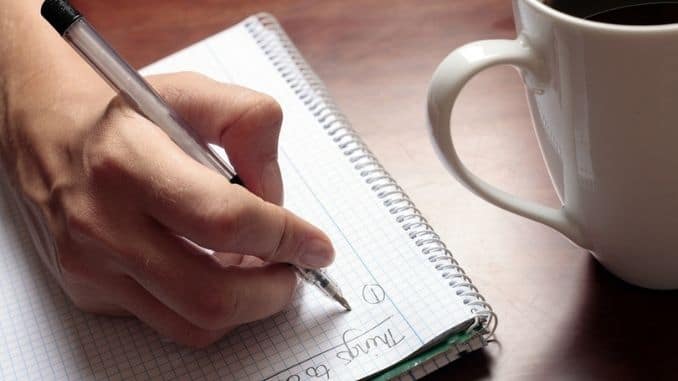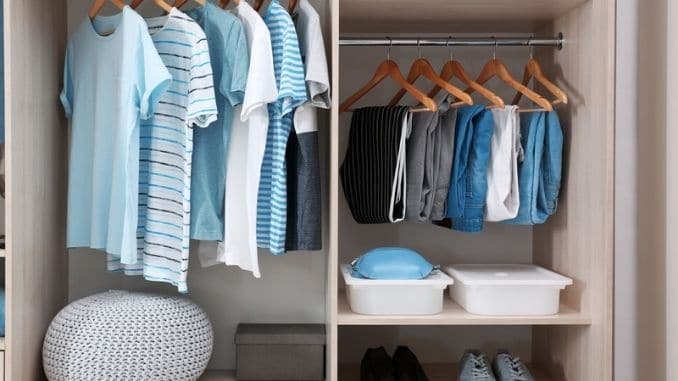
It’s more than a month into the new year, and your desk is a disorganized mess. The kitchen cabinets contain oddly balanced casserole dishes scattered with loose plastic lids waiting to tumble out upon opening. The master bedroom closet is brimming with boxes and bags of who-knows-what, and the garage could use some tidying.

This Is Your Year to Get Organized
We want to help you tackle all of the piles and finally get things in order. Here are nine of our best organizing tips and tricks.
1. Do Things Right Now
If you want to get something done, you have to buckle down and do it. Often, there are things that I dread doing, but I know they have to be accomplished. Those are the things I’m tempted to write down on my “to-do” list for next Thursday. However, I know that those dreadful tasks will get done if I stop planning to do them and just get to work the minute I realize what needs to be completed.
If you know that tax time is coming and you need to get your paperwork in order, there’s no time like the present to get it done. Before you check Facebook, call your sister or watch another episode of “The Walking Dead,” sit down with a cup of tea and start going through those receipts.

2. Write It Down
Do you know how Aunt Betsy always remembers to send a card for your birthday? It isn’t because she has a superior memory or that she recites family birthdays as she falls asleep at night. Aunt Betsy remembers those dates because writes down all the family birthdays on her kitchen calendar each year. She also writes sticky notes with the names of the new neighbors she just met and that one thing she wants to remember to tell you when she sees you on Easter.
Writing things down helps you organize your days and stay ahead of the game. You’ll find that writing little notes to yourself helps you keep your appointments, plan ahead and remember important facts about people you love.
If you’re not a pencil and paper kind of person, use a notes application on your phone. If the information is at all important to you, make sure it’s documented. From tomorrow’s “to-do” list to the lunch date you’ve scheduled with your dad, write it down so that you’ll be prepared for it.
3. Label It
While it may seem like you’ll remember that cereal goes on the top shelf, canned goods on the second shelf and dry pasta on the left at the bottom, you probably won’t. Perhaps if that were the only organizational system you had to maintain, you could try. However, when you add the linen closet system, your desk drawer and the shelves in the garage, it’s a lot to remember.
Either buy a fancy label maker or use small slips of paper and clear tape. Then, label the shelves for where your plates, bowls, and cups should go. Put labels in the cabinet under the sink for which types of cleaners go where. Label the cubbies where your hand towels should be and the drawer that holds your tape.
Creating and posting labels helps you get organized and stay that way. It also helps other people in your home keep things tidy. When there are clear labels that everyone can see, it’s easy to keep an orderly home.
4. Make a Place for Random Items
Phone chargers, keys, batteries, library books and lunch bags ― they’re all items that sometimes end up cluttering the kitchen island or sitting in a lopsided stack near the front door. These items, as well as all of the other odds and ends you’ve collected, need a home.
A decorative, wide-mouth vase makes an excellent storage spot for phone chargers and other cords. Similarly, a pretty tray on the coffee table can hold television remotes, magazines, and notepads. Keys can hang from a hook near the front door and library books can go in a designated spot on the bookshelf.
As soon as items come into your home, find a place to store them when they’re not in use. Items without a designated spot should be donated or discarded. Recently, I found that my reusable shopping bags were floating around the house here and there. I took the largest one, stuffed all of the others inside it, and hung it from a hook on my garage wall ― problem solved. All of my reusable bags now have a home, and they’re no longer cluttering my kitchen.
5. Get Rid of Stuff
Make it a regular routine to shovel out your closets and rooms once a season and donate the items you’re no longer using. It’s amazing how many things we acquire in life. A large portion of the stuff we have stored in our homes is nonessential or serving no purpose other than taking up square footage in the closed.
We recommend sorting through your belongings at the end of each season and taking a load of your unneeded items to a worthy charity. You might even find a nonprofit group that will come directly to your home and pick up your donations. If you find a place that picks up, call them and schedule upcoming donation appointments for now and three months from now. Then, mark your calendar and start decluttering.
You may also want to keep a box in one of your closets so that you can toss in your donation as you find them. When the box is full, store it in the garage and start filling another. It’s much easier to get organized when you have fewer miscellaneous belongings.
6. Use Shelves
When you’re organizing, shelves are essential. You can store books, small bins of craft supplies, seasonal items, keepsakes and games on shelves. A couple of months ago, I put a storage shelf in my garage and ― suddenly ― my garage became so tidy. All of the garden supplies, boots, sporting goods, and auto care products were no longer in crates on the floor. Rather, they were organized perfectly and easily accessible.
Most rooms in your home can benefit from a set of shelves or a bookcase. You can often find them at yard sales and discount stores. In a pinch, you can make a bookcase with some sturdy cardboard boxes and packing tape. Produce boxes and wine crates make decent temporary storage shelves. Similarly, stacked milk crates can serve as excellent storage for all sorts of items floating around your home.
7. Clean Out Your Filing Cabinet ― Or Get One
If it’s been a few years since you’ve sorted through your essential documents and paperwork, it’s time to refine your filing system. If you don’t have a file box or filing cabinet, pick up one for your important paperwork.
You’ll need some hanging file folders with tabs and plain manila folders. Ideally, you should have files for the following categories:
- Tax documents
- Budget and financial
- Employment
- Academic
- Vehicle records
- Medical records
- Identification documents
- Pet records
- Insurance
- Rental property and real estate
- Legal
- Keepsakes
The above categories will be on the tabs of your hanging file folders. Inside, you can have sub-categories in regular manila folders. For instance, inside of the medical records hanging folder, you’ll have a manila folder labeled for each member of the family.
It’ll be easy to keep your paperwork organized with this effective file system. You’ll be able to locate birth certificates, vehicle titles and insurance documents easily when you need them.
As you find papers that you no longer need, but are loaded with personal information, shred them immediately and discard them. Keep only the documents you want and get rid of everything else.
8. Tidy Up Every Night
Certain things should be done every single day without exception. I particularly like to have a clean sink and countertop before bed each night. I also sweep the kitchen floor and tidy up my desk most nights. I find it stressful to wake up to a sink full of dishes and a cluttered kitchen.
There are likely spots in your home that you can tidy up within just a few minutes before bed. Perhaps the couch blankets can be folded and the floor vacuumed. Maybe the bathroom vanities can be straightened and the towels put away. Choose a couple of target areas that you can tackle at the end of the day to bring you a little more organization for tomorrow.
9. Keep a Planner
Overbooking, forgetting appointments and not recognizing birthdays are three common problems that disorganized people encounter on the regular. All of these can be avoided by finding a daily planner that you like and putting it to use.
Take time each week to write down your obligations, special dates and plans so that you can see upcoming events easily and stay ahead of your schedule. You’ll find that you’re more organized and prepared for life when you keep a daily planner.
Get Organized This Year
There are so many wonderful benefits to being more organized. Make 2020 the year that you finally conquer your organizational goals. Work these nine simple organizational tips into your daily habits and enjoy the advantages of a well-ordered life.
Get your eating habits in order by checking out The Best Foods that Rapidly Slim & Heal in 7 Days, here!




